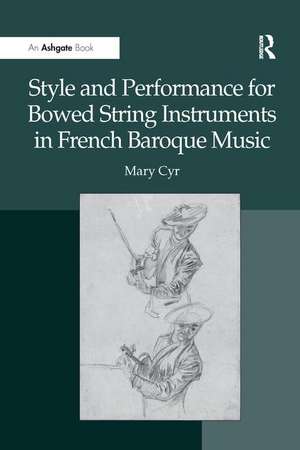Style and Performance for Bowed String Instruments in French Baroque Music
Autor Mary Cyren Limba Engleză Paperback – 26 aug 2016
| Toate formatele și edițiile | Preț | Express |
|---|---|---|
| Paperback (1) | 472.19 lei 6-8 săpt. | |
| Taylor & Francis – 26 aug 2016 | 472.19 lei 6-8 săpt. | |
| Hardback (1) | 1061.81 lei 6-8 săpt. | |
| Taylor & Francis – 13 apr 2012 | 1061.81 lei 6-8 săpt. |
Preț: 472.19 lei
Nou
Puncte Express: 708
Preț estimativ în valută:
90.38€ • 98.21$ • 75.97£
90.38€ • 98.21$ • 75.97£
Carte tipărită la comandă
Livrare economică 21 aprilie-05 mai
Preluare comenzi: 021 569.72.76
Specificații
ISBN-13: 9781138248373
ISBN-10: 1138248371
Pagini: 280
Dimensiuni: 156 x 234 x 15 mm
Greutate: 0.52 kg
Ediția:1
Editura: Taylor & Francis
Colecția Routledge
Locul publicării:Oxford, United Kingdom
ISBN-10: 1138248371
Pagini: 280
Dimensiuni: 156 x 234 x 15 mm
Greutate: 0.52 kg
Ediția:1
Editura: Taylor & Francis
Colecția Routledge
Locul publicării:Oxford, United Kingdom
Notă biografică
Mary Cyr is Professor Emerita of Music at the University of Guelph, Canada.
Recenzii
'Careful consideration of the intersection of written and unwritten music is of the utmost importance to all musicians, but particularly to those whose chosen repertory was born in years long before audio recordings were possible. French music composed between 1680 and 1760 presents stylistic and aesthetic challenges into which viol players in particular have been given insights by player-composers of the time. Mary Cyr generously shares not only her knowledge as a performer, but also her expertise as a musicologist researching seventeenth- and eighteenth-century music in a rigorous scholarly examination of the bowed strings and their techniques and repertory. This book is essential reading, not only for bowed string instrument players, but for anyone who wishes to perform the glorious music of the French Baroque.' Wendy Gillespie, Professor of Music, Indiana University, USA 'This is a beautifully-written account of string instruments, technique, style and repertoire in France during the Baroque era. Mary Cyr knows her sources intimately and discusses them with a fine musical intelligence. This volume is a welcome addition to the literature on historical performance practice.' Peter Walls, Emeritus Professor of Music, Victoria University of Wellington, New Zealand 'Mary Cyr’s work is a welcome and much needed addition to the gambist’s library... The value of this work is unquestionable, especially for musicians who may be taking their first steps with a baroque string instrument or historical performance practice. More experienced early music performers and musicologists may find this work an eye opener to repertoires or techniques with which they are less familiar.' Viola da Gamba Society Journal 'Cyr's handbook on French style neatly fills a gap in the literature, bringing together a wealth of primary source material in a way that performers will find easy to use... Her organized, lucid approach will pique interest in the topic and inspire the curious reade
Cuprins
Part I Sources and Style in French Baroque Music; Chapter 1 Historical Context, Musical Works, and Performance; Chapter 2 French and Italian Musical Style: The Great Divide; Part II Bowed String Instruments in French Ensembles; Chapter 3 Strings in French Ensembles; Chapter 4 Bass Instruments of the Violin and Viol Families in Solo and Ensemble Roles; Part III Interpretation and Style in French Music for String Players; Chapter 5 Articulation; Chapter 6 Tempo, Character, and Inequality; Chapter 7 Ornamentation and Special Effects; Chapter 8 Basse Continue, Pitch, and Temperament; Part IV Composer Profiles; Chapter 9 Marin Marais: Viol Player, Composer, and Teacher extraordinaire; Chapter 10 Élisabeth Jacquet de La Guerre's Violin Sonatas: What the Sources Do (and Do Not) Tell Us; Chapter 11 Jean-Baptiste Barrière, Virtuoso French Cellist and Composer; Chapter 12 Forqueray's Pieces de viole avec la Basse Continuë: Authorship and Performance Issues;
Descriere
Mary Cyr addresses the needs of researchers, performers, and informed listeners who wish to apply knowledge about historically informed performance to specific pieces. Special emphasis is placed upon the period from 1680 to 1760, when the viol, violin, and violoncello grew to prominence as solo instruments in France.
